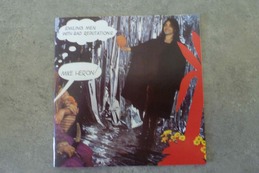 Monday, 29 April 2013
Monday, 29 April 2013
Looking back on the British music scene in the late sixties from the cold hard light of twenty-first century reality there are a couple of things that tend to leave a definite impression. One of them, in an era where some major acts struggle to produce an album every couple of years is the sheer volume of music bands were able to churn out back then.
Quantity, of course, doesn’t always equate to quality, but in the hot house scene that operated then anyone who wasn’t delivering quality product that could be moved tended to vanish into oblivion fairly quickly.
In terms of quantity most acts would have been pushing to match the volume of releases the Incredible String Band rolled out between 1966 (The Incredible String Band) and 1974’s Hard Rope and Silken Twine. There’s a full dozen titles, two of them double albums in that nine year span, and that’s without Mike Heron’s Smiling Men with Bad Reputations (released in 1971) and Robin Williamson’s Myrrh (1972).
Prolific seems rather close to understatement, and the quality was pretty good as well.
Unlike Williamson, who’d started the ISB with fellow folkie Clive Palmer, Heron had been a rocker, something that’s obvious from the beginning of the quite boppy Call Me Diamond, with squealing sax from South African avant-gardist Dudu Pukwana and decidedly rocky piano from Heron himself. Decidedly non-Stringy, but mighty fine fun. Flowers of the Forest sits in more familiar territory for ISB fans, though it’s somewhat rockier than his work in that setting with Richard Thompson’s electric guitar running through the ramble.
There’s something that sounds remarkably like a harpsichord in the introduction to Audrey, which is heading back towards ISB territory with a trace of A Very Cellular Song in the harmonium while he’s expressing a desire (or an intention) to take your clothes off.
Brindaban evokes Hindu mythology, in particular legends involving Krishna and the milkmaids in the town of Vrindavan over an evocative string arrangement, while Feast of Stephen works Cat Stevens territory quite magnificently. A great song that’s on a par with almost anything he managed with the ISB and finishes well ahead of most of the pack.